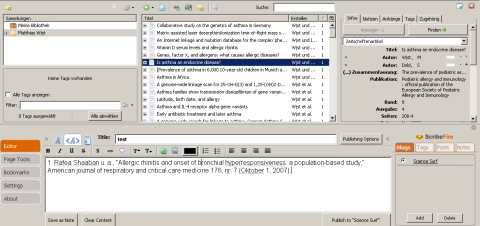Zotero is a browser plugin that I am currently exploring as it can recognize PUBMED or PLoS entries and knows about Endnote/Refer/BibX export in UTF-8 format. The Open Office 2.1 insert reference macro produces a runtime error here and importing 100 references freezes my computer for about 5 minutes. Nevertheless Zotero follows a promising concept and holds much premises for the future; just discovered that data are stored in “…\zotero\zotero.sqlite”, great! one of the best available databases. This is the reason why I will

yea, yea.
Addendum 1
As there is no central Zotero server, I wonder how I could access my local installation from different sites. The recommended portable Firefox is not really an universal solution. As with other open source databases, surrounding code of SQLITE is getting commercialized but there seems to be a free? sqlite server for download.
Addendum 2
This is a more philosophical remark on science publication: With a technical sound solution for online referencing I expect that science blogs will get more influence while printed papers will loose their importance. Post publication peer review (attached comments) is certainly as good as pre publication peer review (that kills many new ideas, always delays publication and costs a lot of money better spent for research). You can cite me for that idea ;-)
CC-BY-NC Science Surf
accessed 20.02.2026


